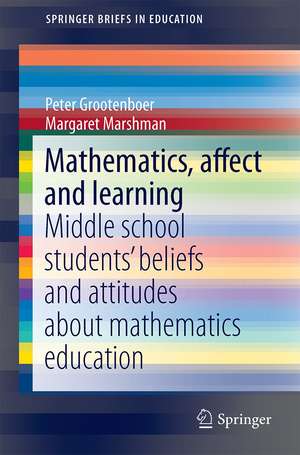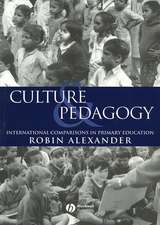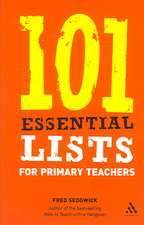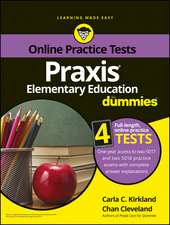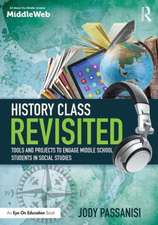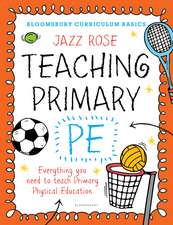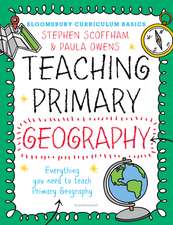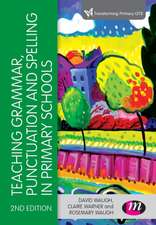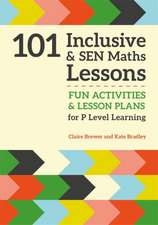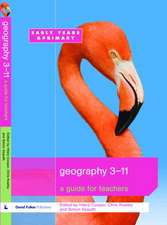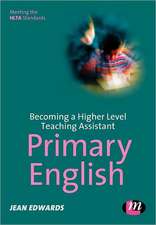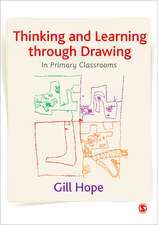Mathematics, Affect and Learning: Middle School Students’ Beliefs and Attitudes About Mathematics Education
Autor Peter Grootenboer, Margaret Marshmanen Limba Engleză Hardback – 24 oct 2015
| Toate formatele și edițiile | Preț | Express |
|---|---|---|
| Paperback (1) | 380.07 lei 6-8 săpt. | |
| Springer Nature Singapore – 23 aug 2016 | 380.07 lei 6-8 săpt. | |
| Hardback (1) | 387.38 lei 6-8 săpt. | |
| Springer Nature Singapore – 24 oct 2015 | 387.38 lei 6-8 săpt. |
Preț: 387.38 lei
Nou
Puncte Express: 581
Preț estimativ în valută:
74.14€ • 76.74$ • 62.66£
74.14€ • 76.74$ • 62.66£
Carte tipărită la comandă
Livrare economică 06-20 martie
Preluare comenzi: 021 569.72.76
Specificații
ISBN-13: 9789812876782
ISBN-10: 9812876782
Pagini: 120
Ilustrații: XVIII, 135 p.
Dimensiuni: 155 x 235 x 15 mm
Greutate: 0.4 kg
Ediția:1st ed. 2016
Editura: Springer Nature Singapore
Colecția Springer
Locul publicării:Singapore, Singapore
ISBN-10: 9812876782
Pagini: 120
Ilustrații: XVIII, 135 p.
Dimensiuni: 155 x 235 x 15 mm
Greutate: 0.4 kg
Ediția:1st ed. 2016
Editura: Springer Nature Singapore
Colecția Springer
Locul publicării:Singapore, Singapore
Public țintă
ResearchCuprins
1 Introduction.- 2 The Affective domain, mathematics, and mathematics education.- 3 Investigating students' ideas about mathematics and mathematics education.- 4 Students' beliefs and attitudes about mathematics and learning mathematics.- 5 Differences in the affective responses of various groups.- 6 Changes in affective responses to mathematics through the middle school years.- 7 Building positive affect in mathematics.
Notă biografică
Associate Professor Peter Grootenboer was a school teacher and leader for 12 years before moving into the tertiary sector. He received a national Jim Campbell Award for teaching excellence. He is now an Associate Professor in Education at Griffith University and a member of the Griffith Institute for Educational Research. His research interests include mathematics education, educational leadership, practice/praxis theory, and issues of social justice.
Dr Margaret Marshman worked as a hospital physicist, in laser physics and mathematical modelling for magnetic resonance imaging before becoming a secondary Mathematics and Science teacher and Mathematics Head of Department on the Gold Coast. She is involved in teacher education in the Graduate Diploma and undergraduate programs and has been involved in the professional development of practitioners through post-graduate programs. She is particularly interested in how students formulate and solve mathematical and scientific problems and also publishes in other areas of mathematical investigations, collaborative learning, middle schooling and mathematics and science education.
Dr Margaret Marshman worked as a hospital physicist, in laser physics and mathematical modelling for magnetic resonance imaging before becoming a secondary Mathematics and Science teacher and Mathematics Head of Department on the Gold Coast. She is involved in teacher education in the Graduate Diploma and undergraduate programs and has been involved in the professional development of practitioners through post-graduate programs. She is particularly interested in how students formulate and solve mathematical and scientific problems and also publishes in other areas of mathematical investigations, collaborative learning, middle schooling and mathematics and science education.
Textul de pe ultima copertă
This book examines the beliefs, attitudes, values and emotions of students in Years 5 to 8 (aged 10 to 14 years) about mathematics and mathematics education. Fundamentally, this book focuses on the development of affective views and responses towards mathematics and mathematics learning. Furthermore, it seems that students develop their more negative views of mathematics during the middle school years (Years 5 to 8), and so here we concentrate on students in this critical period. The book is based on a number of empirical studies, including an enquiry undertaken with 45 children in Years 5 and 6 in one school; a large-scale quantitative study undertaken with students from a range of schools across diverse communities in New Zealand; and two related small-scale studies with junior secondary students in Australia. This book brings substantial, empirically-based evidence to the widely held perception that many students have negative views of mathematics, and these affective responses develop during the middle years of school. The data for this book were collected with school students, and students who were actually engaged in learning mathematics in their crucial middle school years. The findings reported and discussed here are relevant for researchers and mathematics educators, policy makers and curriculum developers, and teachers and school principals engaged in the teaching of mathematics.
Caracteristici
Focuses on the views of middle school students who are experiencing mathematics at the crucial time when their negative (and positive) perceptions are developing Examines the perennial problem of poor attitudes and beliefs about mathematics and offers a student perspective on this issue Viewing mathematics learning as identity development allows readers to understand mathematics pedagogy in a broader, more holistic sense Includes supplementary material: sn.pub/extras
